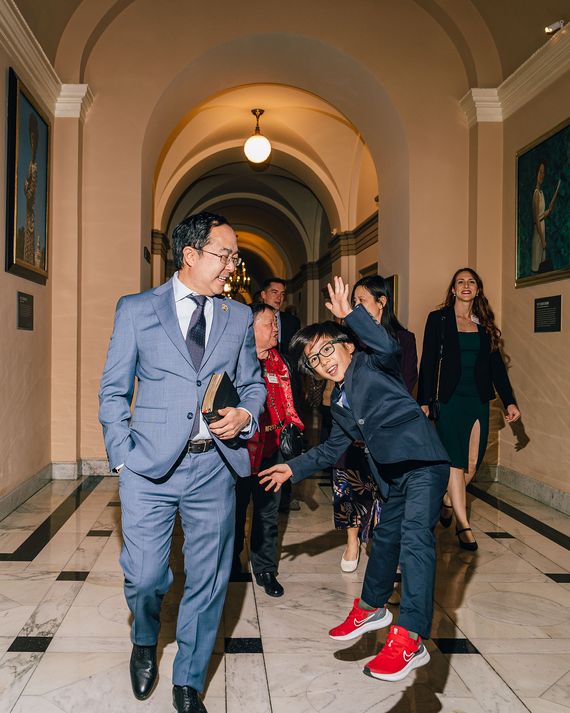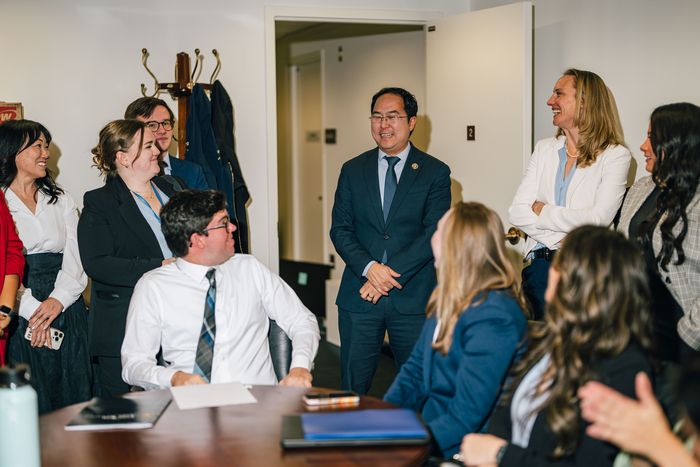
In mid-December, Andy Kim walked out of a lunch meeting with his fellow Democrats in the Capitol and straight up to a bank of cameras. The little-known representative from South Jersey had been sworn in to the U.S. Senate the night before and was now standing next to Chuck Schumer and Adam Schiff, who each took their turn at the mics to talk about the difficult work ahead. The questions came fast and thick: How would Schumer work with a resurgent GOP? Should Joe Biden preemptively pardon officials like Schiff, who had investigated January 6? If the topic of the day was what kind of opposition party the Democrats were going to be in round two of the Donald Trump era, Kim seemed beside the point. No one asked him anything.
Maybe they should have. At 42, Kim is the first Korean American in the Senate and will soon be its second-youngest member. Until recently, he was best known within Washington for cleaning up the ransacked Capitol by hand after January 6. A Rhodes scholar who worked in Afghanistan as a civilian adviser to General David Petraeus and then on counterterrorism in the Obama White House, he won a House seat long held by Republicans in 2018 by focusing on protecting voters’ health care. In November, he won statewide by about ten points by promising to clean up New Jersey’s corrupt politics, four points ahead of Kamala Harris in a deep-blue state that Trump came astonishingly close to carrying. Kim was quickly cast as one of the Democrats’ few national bright spots, both a stalwart liberal and a reformer who might be able to reconnect the party with voters who have come to revile the political Establishment. “I believe a reform agenda is powerful not just in New Jersey but in this country, and I think the results of November 5 very much showed that,” Kim says. He’s watching his words as we make our way through the basement of the Dirksen Senate Office Building and past a corridor of airless temporary rooms for new senators. Kim’s own office is occupied by aides, so we squeak onto plasticky leather couches in a meeting room his staff is using for storage.
Kim and Trump have little in common, but the Democrat too ran explicitly against the status quo, defying his state’s practice of electing a steady stream of insiders. In 2023, he was the first lawmaker to mount a primary challenge to Bob Menendez, the longtime senator who had been hit with allegations of cartoonish levels of graft and was later found to have accepted gold bars and other gifts from friends and foreign governments. Kim’s next obstacle was Tammy Murphy, the wife of New Jersey governor Phil Murphy. She immediately locked up support from the state’s political brass. Kim argued that it all looked dirty, and polls showed that voters agreed, forcing Murphy to withdraw. In the midst of all this, he managed to get a federal judge to scrap the state’s notorious “county line” system, which for decades gave local bigwigs massive influence over the design of Jersey primary ballots — and therefore election results.
All of which might make Kim seem like the sort of fresh face needed to both rejuvenate his ailing party and hold the line against the Republicans. Yet like many other Democrats, Kim is still working out exactly what his role will be in Trump’s Washington. “For me, what’s so stark is the difference between how I felt when I came into the House, as opposed to now,” he tells me. There is only so much the Democrats can do in a government totally controlled by the GOP, which means they will likely have to choose their fights more carefully this time around — at the risk of disappointing constituencies that expect a resistance-style response to the range of threats the Trump administration poses.
As a rookie House member in 2018, Kim says, he was “constantly stressing about how to respond to every new crisis.” Already, Democrats must figure out how to handle Trump’s Cabinet nominees, a multifront battle. Democrats have been horrified by most of Trump’s picks, but they are essentially powerless to stop confirmations unless they can persuade some of their colleagues in the GOP majority to break with their own party. As Kim was sworn in, much of the chatter on the Hill was about Trump’s Pentagon choice, Pete Hegseth, who looks increasingly likely to be confirmed despite accusations of sexual assault and drunken misconduct. (He has denied these.)
Kim is being careful not to say much about almost any of Trump’s nominees before he can interview them. (He made an exception for Matt Gaetz, whose nomination for attorney general he condemned immediately.) “I don’t want to do, like, Whac-a-Mole,” he says. “I want to come up with a framework with which I can approach all the nominations.” He’s widely expected to vote against Trump’s picks but says he is wary of the reflex to respond to Trump’s every move with resistance. “I think I’m better at triaging and recognizing that my job is not to have an opinion about every single new development in American politics,” he says.
He does have strong opinions about the lessons his party should learn; he was disappointed not to be asked for his advice in 2018, when he flipped his conservative district, or in 2020, when he kept it, but has been encouraged to see that Democratic senators who lost have been debriefing their colleagues at their weekly lunches about what went wrong. After his win, Kim says he got a phone call from Barack Obama. When he told the ex-president about the responsibility he felt given Trump’s return to power, Obama reminded him that he’d won his own Senate seat under similar circumstances. George W. Bush was reelected that night, and Democrats looked headed for generational doldrums, just two years before taking back the House and Senate and four years before electing Obama president. “He was very kind in telling me that it’s okay for me to celebrate; it’s okay for me to be proud of my personal achievement in this moment, even if there’s a broader concern in the country,” Kim says. “That should not hold me back from understanding the magnitude of what I’ve accomplished.”
For now, Kim is figuring out what all of this will look like on a day-to-day basis. For one thing, he’s trying to work out his commute schedule between home in the burbs and Washington. This is a positive change: His sons were 1 and 3 years old when he was first elected; he’s been shuttling between Jersey and D.C. ever since. “My older son woke up this morning and came right up to me and said he felt like yesterday was a dream, and I thought that was sweet,” he says, smiling. “I’m hoping that a six-year term gives me a little bit of space to be a dad in a way that I wanted to be and haven’t been able to achieve yet. The idea that the next time I run for reelection they’ll be 15 and 13 is nice. This next six-year term, yeah, I want to get a lot of things done. But at what cost? I can’t have some Pyrrhic victory here, where I navigate the Trump time but come out and realize I’ve destroyed my relationship with my kids.”
He has more immediate considerations, like which committees he should lobby to get onto and how to keep his focus on both good-government issues and foreign policy. An adviser interrupts to let him know he has to go back to the Capitol to cast some routine votes. He looks unfazed, though slightly more befuddled a few moments later when another aide hands him paperwork he needs to fill out so he can get a Senate parking pass. He didn’t sleep much the night before his swearing-in; he has recently been journaling to help process the heavy feelings. He’s wary of the expectations his campaign created that he’ll push Democrats — and Washington — to a new, more responsive era, but he’s eager to test them. “I’m still very suspicious about this work, politics. I don’t trust this world,” he says. “And I know I’m not the first person to come down to D.C. and say, ‘I’m going to change it and make it better.’”































